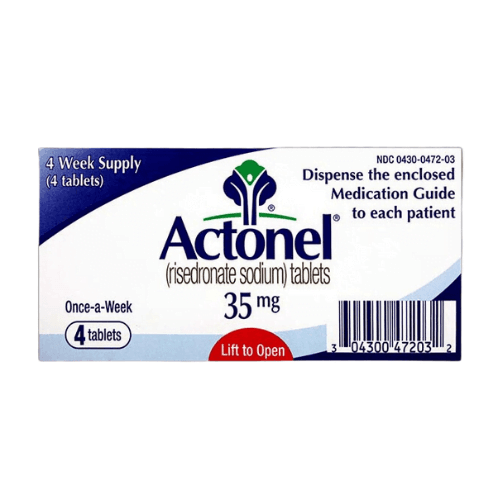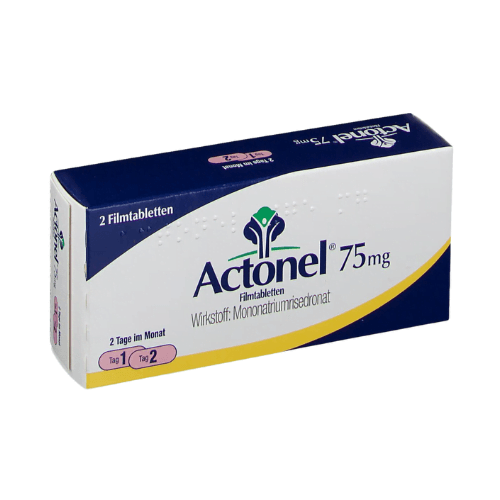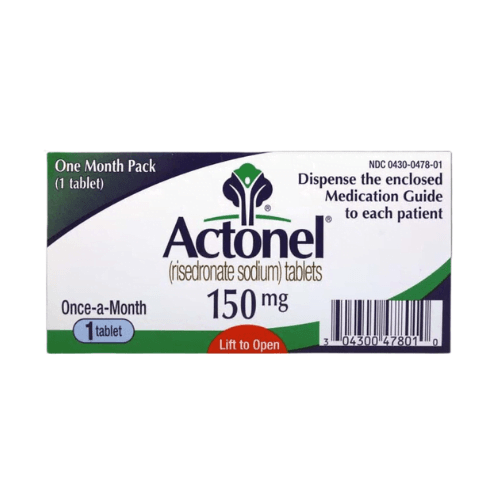Shipping with this method takes 3-5 days
Actonel® Tablets for Osteoporosis
Price range: $95.99 through $103.99
Secure Encrypted Payments
Actonel is a prescription bisphosphonate tablet used to treat and help prevent osteoporosis in adults. It supports bone strength by slowing bone breakdown. This page explains approved uses, safe dosing basics, practical tips, and how to access pharmacy-checked supply at YouDrugstore.
What Actonel Is and How It Works
Actonel® is a bisphosphonate medicine that reduces bone resorption by inhibiting osteoclast activity. That helps improve bone mineral density and lowers fracture risk over time. YouDrugstore is a licensed Canadian pharmacy in Manitoba. Pharmacists review prescriptions before dispensing. For qualified US patients, we provide US delivery from Canada, including options that may fit if you are comparing Actonel without insurance.
The active ingredient is risedronate sodium, a well-studied agent in this class. It binds to bone mineral and acts locally where bone turnover is high. The treatment does not provide pain relief, but it helps stabilize and strengthen bone when taken correctly. Your prescriber will determine if this therapy aligns with your diagnosis and fracture risk.
Who It’s For
This treatment is used for adults with osteoporosis, including postmenopausal women and men with low bone mass. It is also used to prevent fracture in patients at risk due to long-term corticosteroid therapy and to manage bone remodeling symptoms in Paget Disease Of Bone. Review your goals for Osteoporosis care with your prescriber before starting.
People who should not use this medicine include those with low blood calcium, difficulties swallowing, or esophageal conditions that delay emptying. Anyone unable to sit or stand upright for at least 30 minutes should avoid it. Severe kidney disease may limit use. It is not intended for pregnancy. If you are using chronic steroids, see our category on Glucocorticoid-Induced Osteoporosis for context and questions to take to your visit.
Dosage and Usage
Several dosing schedules exist. Your clinician will choose daily, weekly, or monthly use based on your condition and history. Take each dose after rising for the day, on an empty stomach, with a full glass of plain water only. Swallow whole. Stay upright (sitting or standing) for at least 30 minutes after. Do not eat, drink (except water), or take other medicines or supplements until the waiting period is over.
Some adults take this medicine once weekly. If you and your prescriber select that plan, it may help to pick the same day each week for consistency. Avoid calcium, antacids, iron, magnesium, or multivitamins near the dose because they can block absorption. Many people take supplements at a different time of day. Your prescriber may also recommend calcium and vitamin D as part of your bone health plan, taken separately from this tablet.
If your schedule changes, note the date you took a dose, and set reminders for future doses. Hydration is important; use plain water, not mineral water or coffee. If stomach sensitivity occurs, talk with your healthcare professional before making any changes.
The weekly option is sometimes discussed as Actonel once a week, which refers to the regimen rather than a specific strength. Always follow your prescription label and the Patient Information Leaflet included with your pack.
Strengths and Forms
Film-coated tablets in adult doses are commonly supplied. Available strengths include 35 mg and 150 mg tablets. Availability can vary by manufacturer and pack size. Your prescriber and pharmacist can help match the strength and schedule to your diagnosis and fracture risk, and may discuss generic risedronate sodium options.
Missed Dose and Timing
If you miss a daily dose and remember later that same day, skip it and take the next dose the following morning. Do not double up. For weekly use, take the missed dose the next morning you remember, then return to your original schedule on your chosen day. For monthly use, take the dose the next morning you remember, if it is within a few days, then resume your usual monthly date.
If you are unsure what to do, refer to the official Patient Information and speak with your prescriber or pharmacist. Keeping a calendar or phone reminder can help maintain steady intake over time.
Storage and Travel Basics
Store tablets at room temperature in a dry place, away from excess heat or humidity, and out of reach of children and pets. Keep in the original packaging until use to protect from moisture. Do not store in the bathroom. When traveling, pack your medicine in your carry-on bag with the original labeled container. Bring a copy of your prescription and a list of your current medicines. Time zone changes matter less for weekly or monthly schedules, but choose a consistent morning time at your destination and continue your routine.
If you use a pill organizer, keep one row reserved for your weekly or monthly tablet to avoid confusion with daily medicines. Dispose of unused or expired medicine following local guidance.
Benefits
This therapy helps reduce bone breakdown, allowing density to stabilize or improve when taken as directed. Fewer dosing days with weekly or monthly schedules may fit a busy routine. Many patients appreciate having a non-injectable option for long-term bone support. A generic alternative may help lower out-of-pocket costs while maintaining the same active ingredient, when appropriate.
Side Effects and Safety
Common effects can include:
- Stomach discomfort or heartburn
- Nausea or abdominal pain
- Indigestion or constipation
- Muscle, joint, or bone pain
- Headache or dizziness
Serious but less common risks include esophageal irritation or ulceration, severe musculoskeletal pain, eye inflammation, osteonecrosis of the jaw, and atypical femur fractures. Stop the medicine and seek prompt care if you develop chest pain, severe heartburn, new or worsening difficulty swallowing, or thigh or groin pain. Discuss dental health before starting therapy, especially if you need invasive dental procedures or have poor oral health or cancer treatments that increase risk.
Low blood calcium must be corrected before starting. This medicine can increase the risk of low calcium if intake is inadequate; your clinician may advise vitamin D and calcium. Hypoglycemia is not expected unless other metabolic conditions are present or you take interacting medicines; review your full list with a pharmacist.
Drug Interactions and Cautions
Products containing calcium, magnesium, aluminum, or iron can reduce absorption if taken near your dose. Separate this tablet from antacids, mineral supplements, and multivitamins based on label guidance. NSAIDs may increase gastrointestinal irritation; use under clinical supervision. Avoid taking other bisphosphonates at the same time. Severe renal impairment can limit use. If you have active digestive disease, esophageal motility disorders, or cannot remain upright for 30 minutes, discuss alternatives with your prescriber.
Tell your healthcare professional about all prescription medicines, over-the-counter products, and supplements you take. This includes steroids, acid-reducing medicines, and cancer treatments. Your care team can help plan the timing of supplements and meals to minimize interactions.
What to Expect Over Time
Bone-strengthening benefits accumulate gradually with steady use and adequate calcium and vitamin D intake. Many people will not feel day-to-day changes. Your clinician may order bone density tests at intervals to assess response and adjust your plan. If you experience stomach symptoms or trouble following the morning routine, contact your healthcare professional for guidance. Do not change your schedule without medical advice.
Long-term therapy is individualized. After several years, your prescriber may reassess fracture risk and discuss whether to continue, pause, or switch therapy. Staying consistent, choosing reminders, and using the same weekly or monthly dosing day can support adherence and results.
Compare With Alternatives
Other options in the same class include Alendronate, a tablet with daily or weekly schedules. Injectable antiresorptive therapy like Prolia® Prefilled Syringe may be considered for patients who cannot tolerate oral bisphosphonates or have specific risk factors. Discuss lifestyle measures and fall prevention strategies alongside any medicine choice.
Pricing and Access
We offer Canadian pharmacy pricing with Risedronate as a lower-cost generic alternative when clinically appropriate. Check the Actonel price on our product page to compare options and pack sizes. You can also review Risedronate sodium price for generic supply. We provide US shipping from Canada and secure checkout, with prescription required and verified. See current seasonal offers on our Promotions page.
Availability and Substitutions
Supply can vary by strength and manufacturer. If a selected pack is not available, your prescriber may recommend a suitable alternative or a generic substitution. Our team can coordinate with your clinician to ensure the correct strength and schedule are maintained.
Patient Suitability and Cost-Saving Tips
Good candidates include adults diagnosed with osteoporosis who can follow the morning administration rules and remain upright for at least 30 minutes. Those with esophageal disorders, severe kidney disease, or uncorrected hypocalcemia may need a different approach. If you have extensive dental work planned, discuss timing before starting therapy.
To save on costs, ask your prescriber if a generic risedronate tablet is appropriate, consider multi-month fills to reduce per-fill fees, and use refill reminders to avoid gaps. Review your bone health plan during each visit, and keep a list of medicines and supplements to streamline renewals. You can also browse Womens Health to see related therapies and supports.
Questions to Ask Your Clinician
- Which dosing schedule best fits my routine and risks?
- Do I need calcium and vitamin D, and how should I time them?
- What stomach or swallowing symptoms should prompt a call?
- How will we monitor bone density and fracture risk?
- Is a generic risedronate option suitable for me?
- What should I do before dental procedures while on this medicine?
Authoritative Sources
DailyMed: Risedronate Sodium TabletsHealth Canada Drug Product DatabaseManufacturer Information
Start your prescription request for Actonel US shipping with prompt delivery. This content is educational and not a substitute for medical advice. Always follow your prescriber’s instructions and the official label.
Express Shipping - from $25.00
Prices:
- Dry-Packed Products $25.00
- Cold-Packed Products $35.00
Shipping Countries:
- United States (all contiguous states**)
- Worldwide (excludes some countries***)
Standard Shipping - $15.00
Shipping with this method takes 5-10 days
Prices:
- Dry-Packed Products $15.00
- Not available for Cold-Packed products
Shipping Countries:
- United States (all contiguous states**)
- Worldwide (excludes some countries***)
How does this medicine strengthen bone?
It works by inhibiting osteoclasts, the cells that break down bone. Less resorption helps your skeleton keep more mineral content, improving bone density over time. The tablet binds to bone surfaces and acts locally where turnover is high. Benefits depend on taking it as directed with water on an empty stomach and staying upright. Your clinician may check bone density periodically to assess progress and adjust your plan as needed.
What are the main dosing schedules?
Your prescriber may recommend a daily, weekly, or monthly schedule. Each dose should be taken after rising, with a full glass of plain water, before food or other medicines. Remain upright for at least 30 minutes. The choice depends on your diagnosis, fracture risk, and tolerance. Do not change the schedule without medical advice. If you have trouble swallowing tablets or following the morning routine, discuss alternatives.
What should I avoid when taking it?
Do not take it with food, coffee, juice, or mineral water. Avoid calcium, iron, magnesium, or aluminum products near the dose because they bind the medicine and reduce absorption. Wait at least 30 minutes before eating, drinking anything besides water, or taking other medicines. If you use NSAIDs or have digestive issues, talk with your healthcare professional to reduce stomach irritation risks.
Who should not use this therapy?
People with low blood calcium should correct it before starting. Avoid use if you cannot sit or stand upright for 30 minutes or have esophageal conditions that delay emptying. Severe kidney disease may limit use. It is not intended for pregnancy. If you need invasive dental work or have poor oral health, discuss timing and preventive steps with your clinician before beginning or resuming therapy.
What side effects are most common?
Common effects include stomach discomfort, heartburn, nausea, constipation, and musculoskeletal pain. Headache and dizziness can occur. Rare but serious events include esophageal irritation or ulceration, severe bone or joint pain, osteonecrosis of the jaw, and atypical femur fractures. Seek help promptly for chest pain, severe or worsening heartburn, difficulty swallowing, or new thigh or groin pain.
How long will I need to take it?
Duration varies. Many adults use an antiresorptive therapy for several years, then reassess with their clinician. The decision depends on fracture risk, bone density changes, and tolerability. Your prescriber may discuss continuing treatment, switching, or pausing after a set period. Keep all follow-up appointments and bone density tests so your plan reflects your current risk and response.
Is there a generic option?
Yes. Risedronate sodium contains the same active ingredient as the brand and is available in tablet form. Your prescriber can advise whether a generic is appropriate for your specific schedule and dose. Many people choose this alternative to lower out-of-pocket costs while maintaining clinical goals. Always confirm that your substitution matches the strength and dosing plan on your prescription label.


